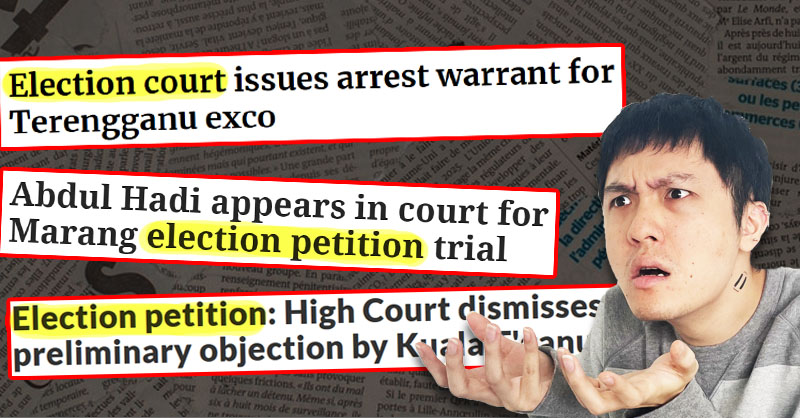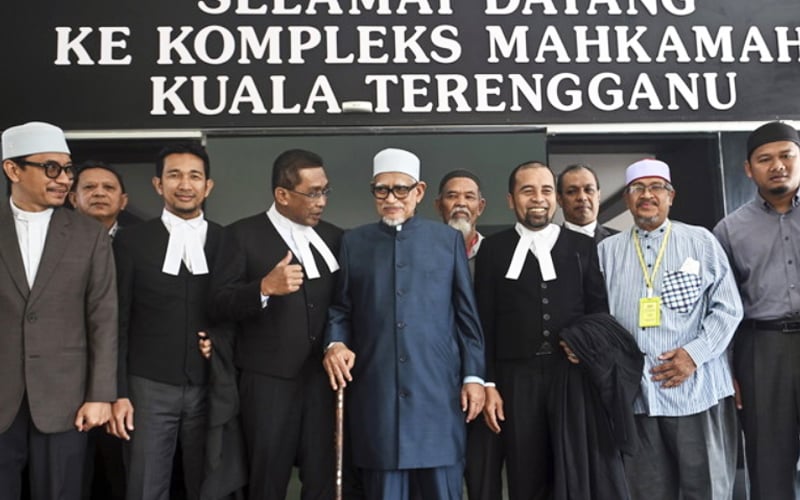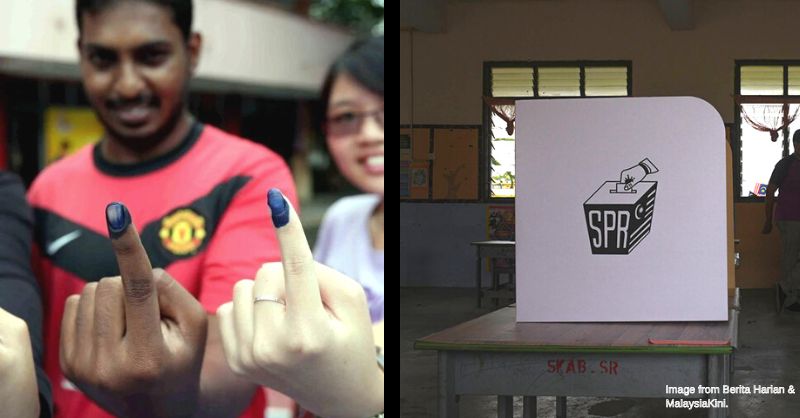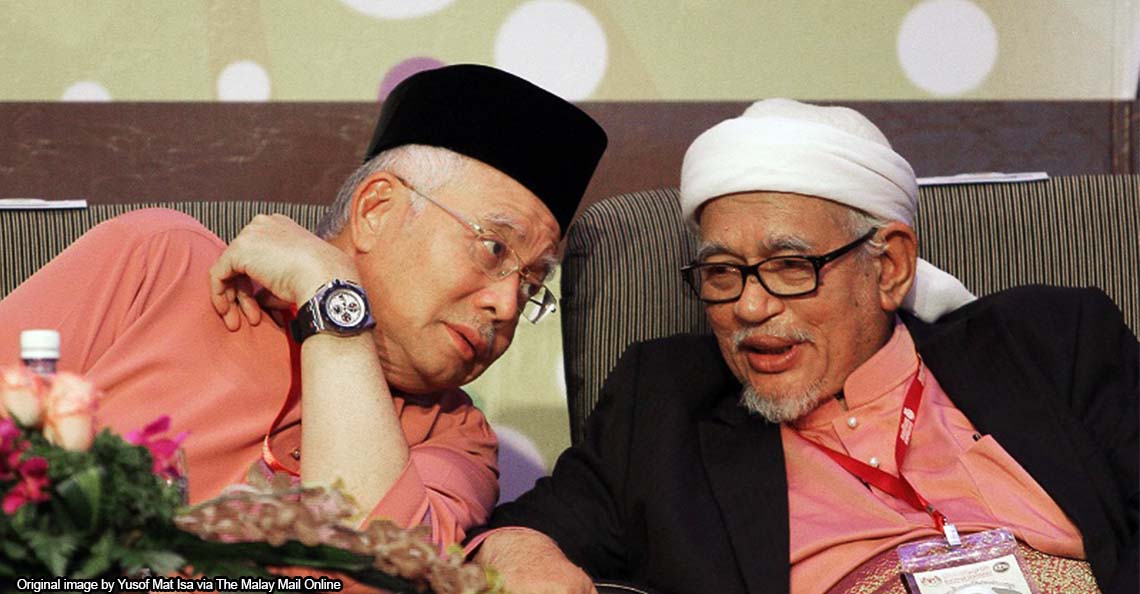Why are so many politicians suddenly going to Election Court?

- 56Shares
- Facebook32
- Twitter7
- LinkedIn5
- Email5
- WhatsApp7
If you’ve been reading the news recently, you might’ve seen the words ‘Election Court’ lot, and you probably thought to yourself, “Huh? Election Court? Malaysia got Election Court meh?“.

Yes, dear reader, we do have Election Courts in Malaysia, and they’re there to hear election petitions. Basically, an election petition is a way for people to challenge allegedly shady election results, like if bribery was involved. We’ll be expanding more on that a bit later, but first, you gotta know that…
Any High Court in Malaysia can be an Election Court

Yep, there’s no specific building called the ‘Election Court’. According to the section 36 Election Offences Act 1954, the judge who’s gonna listen to the petition will either be a High Court Judge selected by the Chief Justice of Malaysia (the captain of all judges in Malaysia, essentially), or the Chief Justice themselves. That means any High Court in Malaysia can be an Election Court, depending on where the petition is started.
Take the current petition that’s currently going on in Terengganu as an example of how that works – UMNO’s Terengganu branch started three petitions to challenge PN’s victories in Marang, Kuala Terengganu and Kemaman. Given the constituencies involved, the Kuala Terengganu High Court was chosen as the Election Court for the petitions, and High Court Judge Datuk Hassan Abdul Ghani was chosen to sit as the Election Judge.
Now that we’ve got the preliminary info out of the way, how can you start your own election petition? The first thing to keep in mind is that…
The requirements to start an election petition aren’t that strict

For starters, if you want to file an election petition, you must be either, according to section 34 of the Election Offences Act 1954:
- someone who voted or had a right to vote at the election that’s relevant to the petition;
- a candidate at said election; or
- someone who had a right to be returned or elected at said election
The first two requirements should be pretty clear cut, but who’s ‘someone who had a right to be returned or elected’ at an election? It just means that you had to be eligible as a candidate at the election. So, yeah, it’s not hard to qualify as someone who can start an election petition.
“Wah, so senang can start an election petition, that means can win very easy also loh?” No, my sweet summer child…
It is very hard to prove that an election was affected by funny business

Section 32 of the Election Offences Act 1954 lays out the grounds (a.k.a. reasons) for an election petition, and we’re gonna list a more simplified version down here:
- Bribery, ‘belanja’ or extreme intimidation that affected the result of the election;
- Not following laws that have to do with elections, and that affected the result of the election;
- Corruption and illegal practices in connection with the election by a candidate or with his knowledge or consent, or by any agent of the candidate;
- The candidate personally got a person who has been convicted or found guilty of corrupt practices within the last seven years to be his agent or canvasser; or
- The candidate was at the time of the election a person disqualified for election
Not everything on that list has to be proven, just one is enough. Proving any one of them beyond a reasonable doubt is, however, very tough, and there’s a reason for it. Art Harun – ex-Chairman of the Election Commission, ex-Speaker of the Dewan Rakyat, and lawyer – said that to file an election petition is essentially to challenge the will of the majority that went into the election:
“Now, what is being challenged in an election petition is actually the will of the majority expressed in the election. Being so, in order to sustain that challenge, sufficient reasons must be shown to unseat the will of the majority. Those reasons proffered by the challenger must thus satisfy a high legal burden.” – Art Harun, in his article responding to Rafizi Ramli
If so senang can win election petitions, then what’s the point of holding elections in the first place, right?
On top of that, the lawyer that’s hired for the petition has to be very familiar with the process, as there have been cases in the past where petitions have been thrown out by Election Courts for not following procedure or requirements. For example, this petition in 2018 was thrown out because the petitioner (and his lawyer) didn’t properly identify what the wrongdoing was, and they weren’t specific enough with the details in the petition.
Having said all of that…
It is possible for election petitions to succeed

To clarify, yes, it is possible for election petitions to succeed, but again, from what we can tell, it’s harder than sticking an elephant through the eye of a needle. In the past two years alone, there have been more than ten petitions filed nationwide, and in contrast, only twice in Malaysian history have election results been nullified due to election petitions:
- Once in 2019 where the Election Court in Kota Kinabalu voided former foreign minister Datuk Seri Anifah Aman’s Kimanis seat win; and
- Once in 2018 where the KL Election Court vacated ex-MIC Vice President C Sivarraajh of his Cameron Highland seat
In both cases, re-elections were held to get new representatives into the seats. So… if you wanna actually start an election petition, just remember these three crucial things – get a lawyer who is knowledgeable in this area of law, make sure you have a good reason for filing the petition, and make sure you have concrete proof of the wrongdoing that happened. If any of y’all lawyers out there think we missed something out, let us know in the comments.
- 56Shares
- Facebook32
- Twitter7
- LinkedIn5
- Email5
- WhatsApp7



